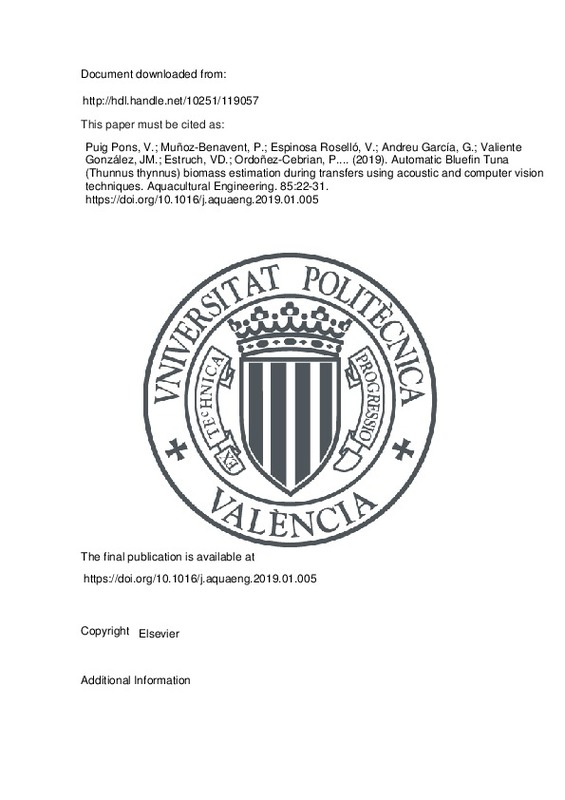Puig Pons, V.; Muñoz-Benavent, P.; Espinosa Roselló, V.; Andreu García, G.; Valiente González, JM.; Estruch, VD.; Ordoñez-Cebrian, P.... (2019). Automatic Bluefin Tuna (Thunnus thynnus) biomass estimation during transfers using acoustic and computer vision techniques. Aquacultural Engineering. 85:22-31. https://doi.org/10.1016/j.aquaeng.2019.01.005
Por favor, use este identificador para citar o enlazar este ítem: http://hdl.handle.net/10251/119057
|
Título:
|
Automatic Bluefin Tuna (Thunnus thynnus) biomass estimation during transfers using acoustic and computer vision techniques
|
|
Autor:
|

 Puig Pons, Vicente
Puig Pons, Vicente
 Muñoz-Benavent, Pau
Muñoz-Benavent, Pau

 Espinosa Roselló, Víctor
Espinosa Roselló, Víctor

 Andreu García, Gabriela
Andreu García, Gabriela

 Valiente González, José Miguel
Valiente González, José Miguel
 Estruch, V. D.
Ordoñez-Cebrian, Patricia
Estruch, V. D.
Ordoñez-Cebrian, Patricia

 Pérez Arjona, Isabel
Pérez Arjona, Isabel

 Atienza-Vanacloig, Vicente
Mèlich, Begonya
De la Gandara García, Fernando
Santaella, E.
Atienza-Vanacloig, Vicente
Mèlich, Begonya
De la Gandara García, Fernando
Santaella, E.
|
|
Entidad UPV:
|
Universitat Politècnica de València. Instituto de Investigación para la Gestión Integral de Zonas Costeras - Institut d'Investigació per a la Gestió Integral de Zones Costaneres
Universitat Politècnica de València. Departamento de Matemática Aplicada - Departament de Matemàtica Aplicada
Universitat Politècnica de València. Departamento de Física Aplicada - Departament de Física Aplicada
Universitat Politècnica de València. Departamento de Informática de Sistemas y Computadores - Departament d'Informàtica de Sistemes i Computadors
|
|
Fecha difusión:
|
|
|
Resumen:
|
[EN] In this work, acoustic and computer vision techniques are combined to develop an automatic procedure for biomass estimation of tuna during transfers. A side scan sonar working at 200¿kHz and a stereo camera, positioned ...[+]
[EN] In this work, acoustic and computer vision techniques are combined to develop an automatic procedure for biomass estimation of tuna during transfers. A side scan sonar working at 200¿kHz and a stereo camera, positioned facing towards the surface to record the ventral aspect of fish, are set as acquisition equipment. Moreover, a floating structure has been devised to place the sensors between cages in transfers, creating a transfer canal that allows data acquisition while fish swim from donor to receiving cage. Biomass assessment is computed by counting transferred tuna and sizing a representative sample of the stock. The number of transferred tuna is automatically deduced from acoustic echograms by means of image processing techniques, whereas tuna size is computed from the stereo videos using our automatic computer vision procedure based on a deformable model of the fish ventral silhouette. The results show that the system achieves automatic tuna counting with error below 10%, achieving around 1% error in the best configuration, and automatic tuna sizing of more than 20% of the stock, with highly accurate Snout Fork Length estimation when compared to true data from harvests. These results fulfil the requirements imposed by International Commission for the Conservation of Atlantic Tunas for compliant transfer operations.
[-]
|
|
Palabras clave:
|
Underwater computer vision
,
Underwater acoustics
,
Bluefin Tuna biomass estimation
|
|
Derechos de uso:
|
Reconocimiento - No comercial - Sin obra derivada (by-nc-nd)
|
|
Fuente:
|
Aquacultural Engineering. (issn:
0144-8609
)
|
|
DOI:
|
10.1016/j.aquaeng.2019.01.005
|
|
Editorial:
|
Elsevier
|
|
Versión del editor:
|
https://doi.org/10.1016/j.aquaeng.2019.01.005
|
|
Código del Proyecto:
|
info:eu-repo/grantAgreement/MINECO//CTM2015-70446-R/ES/ACUSTICA Y BIOMETRIA DEL ATUN ROJO (THUNNUS THYNNUS)  /
info:eu-repo/grantAgreement/MAAMA//ES13%2F41/ES/Desarrollo de un sistema de medida de la biomasa en transferencias entre jaulas de atún rojo mediante técnicas acústicas y ópticas (BIACOP)/
|
|
Agradecimientos:
|
This work was supported by funding from the BIACOP project, ES13/41, from the EU Fisheries Control Programme through the Secretaría General de Pesca, Ministerio de Agricultura, Alimentación y Medio Ambiente (MAGRAMA), and ...[+]
This work was supported by funding from the BIACOP project, ES13/41, from the EU Fisheries Control Programme through the Secretaría General de Pesca, Ministerio de Agricultura, Alimentación y Medio Ambiente (MAGRAMA), and by ACUSTUNA project ref. CTM2015-70446-R (MINECO/ERDF, EU). The BIACOP project has been possible thanks to the collaboration of the Spanish company Grup Balfegó S.L. that also supplied boats and divers to acquire underwater video in the Mediterranean Sea. Special personal acknowledgements to Manuel Guijarro and Antonio López, and to David Baizán from IMA – Acuicultura Integrada Multitrófica S.L.U., for their assistance with the design and construction of the floating structures.
[-]
|
|
Tipo:
|
Artículo
|







![[Cerrado]](/themes/UPV/images/candado.png)


